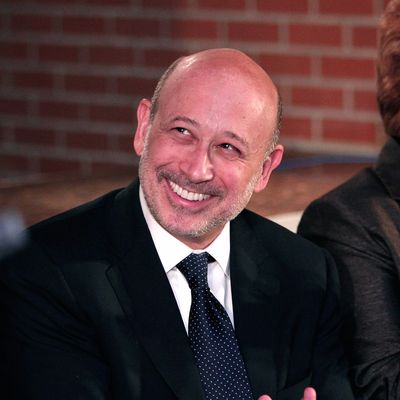
As you may have heard, Goldman Sachs released its fourth-quarter earnings today. In previous years, this was an occasion for the denizens of 200 West Street to pop Dom Pérignon, toast to their fortunes, and start counting their massive bonus checks.
Today, Goldman is breaking out the André. The bank reported a measly $2.3 billion in fourth-quarter profit, down 19 percent from last year’s haul. Bond trading was down. Stock trading was down. In fact, the only part of Wall Street’s most powerful investment bank where real, impressive growth is happening? The investment banking part.
Goldman’s revenue from investment banking rose 22 percent over last year’s levels. As The Wall Street Journal points out, the recovering IPO market helped. So did the increase in debt underwriting — perhaps a last-minute attempt by corporations to issue new bonds before interest rates rise.
But what’s basically happening here is that Goldman, like every other bank, is being forced to make money in more boring ways. They can’t build huge, internal hedge funds or private equity arms, thanks to the Volcker Rule. They can’t use their bond or commodity trading divisions as de facto proprietary trading desks. And the only big chunk left is the stuff they used to do — the relatively ho-hum work of advising on mergers, underwriting stock offerings, and managing money for obscenely wealthy people.
Ben White has a story in Politico today about how “Washington beat Wall Street” by forcing new regulations down banks’ throats and giving up little in the way of concessions to lobbyists along the way. White claims that “the transformation of Wall Street is so complete that even some of the industry’s loudest critics — rarely willing to give an inch — are prepared to declare at least partial victory.”
That’s not wrong. As I wrote last fall, Wall Street is a far different place than it used to be, and post-crisis reformers have a lot to feel good about.
But I’m willing to concede that this whole line of thinking — that investment banks are chastened when they can only do investment banking profitably, to the tune of $2.3 billion a quarter in Goldman’s case — is a little odd. And it might help explain why even robust financial reforms feel a little flat out on Main Street. When regular people get beat, they lose their houses and jobs. When investment banks get beat, they just become investment banks.





























